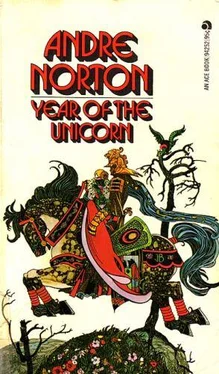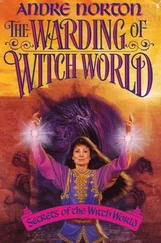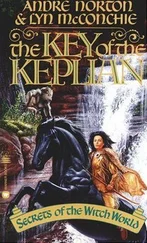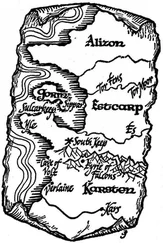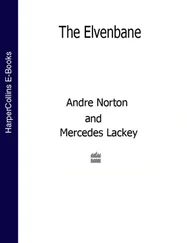We came out of the woods at last, but the level meadow lands through which the road had led me before now gave way to rolling country, not too unlike the Dales, though perhaps their rises and valleys were not as steep. A bird flew from nowhere to hang above us.
I heard Herrel laugh shortly. “They are well served.”
“It means us some harm?” I questioned. The bird was small, rusty brown, unlike any hawk or winged instrument of war.
“In this much, it watches our path. But they need not keep such a check upon us. There is only this road for us.”
He called aloud in another tongue, that, I believe, of.
“Has this land of yours no water?” I ran tongue over dry lips. “Also, one of humankind can not live on hope and words alone—there needs must be bread and meat—”
“Ahead—” his answer was one curt word where I had attempted to make my complaint light. Broken as the land about us was, yet did it seem empty of all but us and the birds. But the meadows had not been empty yesterday, save to the outer sight. And mayhap Herrel saw more here than I did. That I must know.
“Herrel—is this land empty as I see it under the illusion, or is it inhabited?”
“Under the illusion—how so?” He sounded genuinely perplexed, so I told him of the manor and the village, and how I had run from there because I believe I had been detected, if not really seen.
“This man in the inn room, of what manner was he?” Out of all my story Herrel caught upon that first.
From memory I tried to build a picture of him. When I had done I ended with a question: “Who was—is—he? And could he have known I was there?”
“He was of the Border Guard by your description. As such he is sensitive, one trained to the ferreting out of any invader. Hard though the way into Arvon may be, still through time men have come into these lands unknowing. For the most part the illusion holds, they see naught but the road, or some ruins. And they are worked upon by threats to the spirit which gives them a dislike of the place, so they pass through. But when you sought the inn, the guard would know an alien presence was there, and that it was aware of more than an empty land. That was why the alarm went forth. You after kept to the road, which was your safety—had you known it—”
“Why can I see only the illusion, save when I call upon my power?”
“You entered not by the gate, but by the mountain.”
Again his arm tightened about me. “And those are filled with many entrapments. How you came safely by all those snares, that is also magic—yours. Tell me, what of that road, and how did you find it?”
So I went back to my awaking in the deserted camp and when I spoke of the coming of the Hounds, then did I hear his breath quicken with a sound like unto a cat’s hiss of anger. I told of the vial and the way I freed it from my bag and there he interrupted:
“True witchery! There is no denying your gift. Had you the proper lessoning in it then—”
“Then what?”
“I do not know, it is not our sorcery. But I think in some ways you might challenge the whole Pack and come off unscathed. So you left those dogs of Alizon asleep in the snow. Let us hope that winter cold made that sleep death! But the Gate was closed-spell laid and bound again—so how found you another way?”
“Up and over the heights—” I told him of that climb, of my blind struggle with the shifting stones.
“Those were the ruins of Car Re Dogan—reared by wizardy to be a fortress against the evil which once roamed the waste and which is long since gone. You found a very ancient way, one our race has not trod for half a thousand of Dale years.”
I spoke of the barrier of light and its overthrow, and then of my coming into the places of the Guardians.
“The Setting Up of the Kings” Herrel identified for me. “They were the rulers of an elder age. When we first came to Arvon those of that blood were very few, but we mingled with them and took from them some customs which had merit. Thus they did use their kings when each died in turn. So was he buried, standing, allowed to look out upon the world. And should his successor need good council he went thither and abode for a night, waiting to hear that wisdom, or to dream it. Also they were ensorcelled to guard this land.”
“I felt that I was weighed, yet they passed me through—”
“Because they knew the kinship of your power. But—” Herrel’s voice was troubled, “if you came that way, there are other and far worse dangers to be faced—”
I could not repress a shiver. “Yes, one of them I saw—or saw in part.” And I told him of that noisome, clouded thing which passed me in the night.
“That which Runs The Ridges—! Gillan, Gillan, you have such fortune cloaking you as I have not heard of before! That you survived even so chance a meeting as that! It can not come into our fields, but it is death such as no living thing should ever meet.”
“The rest you know—” Suddenly I was very tired. “Herrel, where is this drink you promised me? It seems an age since I had aught to even wet my lips.”
“For once I may give you what you wish as you wish it.” He swung the horse off the road and we came to a small shallow stream bubbling along over a pebbled bed. The very sound of that water increased my thirst, so that I wanted nothing more than to plunge head and arms into it, lap at its surface as a dog might lap. But when Herrel aided me down from the saddle I was almost too weak and tired to move.
He brought me to the water’s edge and took a small horn cup from his belt pouch, filling it and lifting it to my lips.
“It would seem that I need this and food greatly.” I commented when I had drunk my fill. “I am as one emptied—”
“For that also there is an answer.” But I thought that he spoke too briskly and avoided my eyes.
“You said that you believed I was one who could listen to the truth, Herrel. It is more than need of food and drink which makes me thus weak, is that not so?”
“I said that time was our enemy. By now they know that I failed them. Now they draw on your life substance to feed their Gillan. They can not slay so, but they can weaken, and so slow your searching, until it is too late.”
I looked down at my hands. They were trembling a little, and I could not, by will or muscle, control that tremor. But—
“Fear is also a weapon they must use, my fear.” I do not know whether I meant that as a question or a statement, but he answered me.
“Yes. In any way they may shake your confidence, or your spirit, by that much do they profit.”
I returned then to the question I had asked earlier. “Is this an empty land through which we ride, or has it those living here who can be roused against us?”
“It is not as populated as the plains beyond the forest. There are scattered keeps and manors. As to their being set against us—had you been alone they would have mustered against you at the bidding of the Border Guard. Now that you are with me they are willing to let it be a personal thing with the Were Riders.”
“But you said we ride a dangerous way—”
“The Riders will rouse what they may to front us.”
“I had thought Arvon was a fair and smiling land, without peril.”
Herrel smiled a wry smile. “Alas, my lady, one remembers, when one is far apart from one’s beloved, only the fairness of her face, the sweetness of her words. Long were we severed from Arvon and our small memories were of her smiling face, which was what we wished most to recall. All lands hold both good and evil. In the Dales of High Hallack such good and evil is born from the deeds of men or nature. In Arvon it may be born from sorcery and learning. I told you once—we rode in exile because we were deemed disturbing factors, like to bring dissension into seeming peace. But that was not altogether so—though we were made to remember it thus. There have been struggles for power here, too—though sometimes fought with more fearsome weapons than sword blade and arrow head or even those Alizon arms which spit killing fire. We rode in exile because we had supported lords who went down to defeat in one of those ancient battles. And then the memory that exile was of our own unworthiness was fostered upon us. As there was a treaty we were allowed our time of grace to apply at the Gate—and it was opened to us.
Читать дальше
